International Heritage Centre blog
The Salvation Army in Post-War Germany
The Salvation Army in Post-War Germany
Following the rise to power of the National Socialist German Workers’ Party in Germany in 1933, The Salvation Army, which had worked in Germany since 1886, faced increasing pressure and restrictions under the Third Reich regime. Papers in our archive shed light on the work of the Army in Germany during the Second World War and allow an insight into the scale of the humanitarian crisis in the aftermath of the war. Here, I’ll highlight a report on Germany from the papers of Europe Zonal Department (Reference: EUZ) that recounts the situation in Germany through these years.
‘The spiritual work during the war period cannot be said to have been officially dissolved or even stopped. Nazi administration and air bombardments severely hampered and impoverished it, destroyed halls and quarters, and scattered the officers. But the Work continued.’
In October/November, 1945, Commissioner F Barrett submitted a report upon his return from a visit to a post-war Germany. A thorough and fascinating read, the 50 page report is structured into sections, beginning with a background ‘history’ that describes the difficulties encountered by The Salvation Army leading up to and during the war. Commissioner Barrett writes that, ‘The National Socialist Party in Germany in its early days of 1933-1944 gave us but little difficulty’, and that a decree was issued by Chancellor Hitler that allowed the sale of ‘The Kriegsruf’ (German War Cry). In the same papers, we hold a translated copy of a 1934 letter from the Reich Treasurer, which states that ‘…according to the Fuehrer, The Salvation Army is not to be interfered with in their activities. In accordance with the Reich Minister for Finances I have now permitted the public sale of the magazine ‘The War Cry’.’
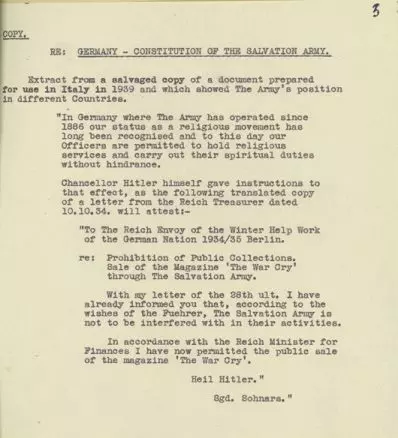
Despite this early grace received, The Army began to encounter problems which culminated in the confiscation of The Army’s properties and an order to stop their work in 1942. The attempts to have this decision reversed, detailed in full by Barrett, span over fifteen months until The Ministry of the Reich of the Interior inform The Salvation Army that ‘The decision about the right of possession with regard to the properties on which the institutions of the Salvation Army (Heilsarmee) have been working, has been put back until the end of the War according to decree of 20th September, 1943.’
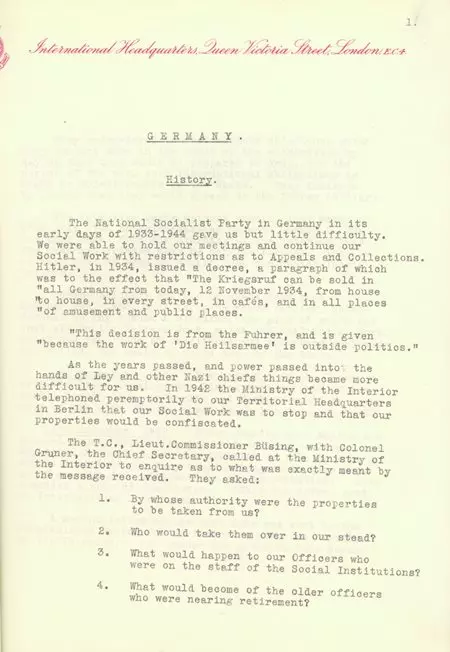
‘Berlin is a city of miles and miles of ruin and rubble inhabited by starving and weakened people. Babylon could not have been worse. Cologne, Hamburg, Hanover and other cities and towns are much the same. They exist, and yet are not.’
Following Germany’s defeat to the Allied powers, four occupational zones were established: American, British, French and Soviet. The report discusses the confusion over the zones, which each have ‘a different method of administration’, the ‘misery’ of the suffering German people, and the unfolding chaos as refugees flocked to Berlin. The complex politics at play are also discussed in the report with Commissioner Barrett commenting that the Russians hold a ‘strategic position’ and ‘may be said to be the real masters of Berlin’, whilst the British and Americans are in a ‘perilous position’. He adds that, ‘British lorries are forbidden to pass through the Russian Zone after nightfall because of marauding displaced persons and indisciplined Russian soldiers.’ Complicating this are the huge numbers of refugees passing through these zones ‘in defiance of the orders of the military, creating chaos…Human wrecks they are, who beg, plead, wait, sleep, suffer and die in the stations and the streets.’ Meanwhile, the German people, described as ‘bewildered by their defeat’, are facing a winter where Commissioner Barrett fears ‘vast numbers in the cities may die of cold and starvation’.
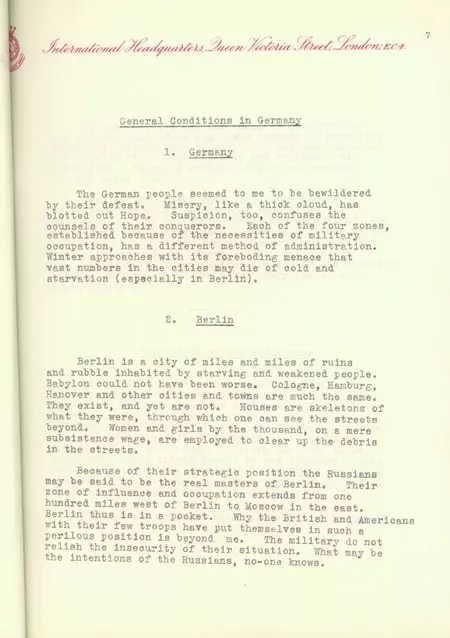
‘…for fifteen years the Heilsarmee has kept out Nazi-ism as such.’
In a section titled ‘The Spirit of the Heilsarmee’, Barrett reports appraisingly on the responses of the German Officers who in ‘deplorable conditions…are continuing their Salvation and Social Work, in the true international spirit.’ This is despite the fact that ‘Two-thirds of their Homes and Halls and Social Institutions have been razed to the ground through aerial and artillery bombardment’ and that ‘Most of the Officers have lost all they possessed’.
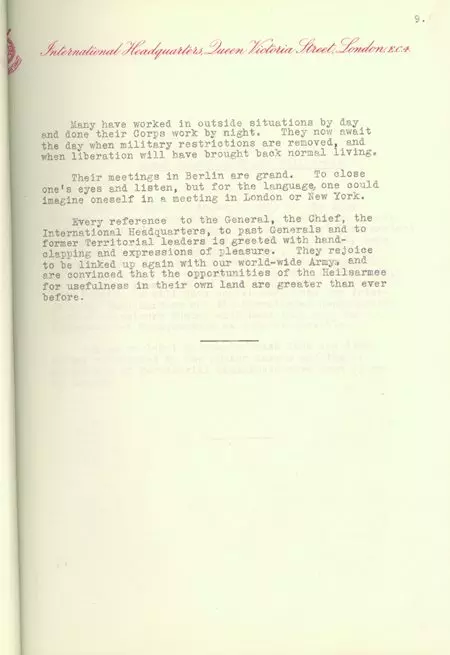
Barrett’s extensive report continues on to recount his observations including the moving personal experiences of various Officers, including those ‘who became Nazis’. Statistics are recorded for the damage sustained to Salvation Army property with the words ‘totally destroyed’ appearing frequently. The report has a matter of fact tone and yet the detail provided gives an insight in the difficulties that lie ahead for both the country, and The Salvation Army’s work within it. He concludes that whilst ‘People are willing to send their children to us; glad to undo the teachings of Hitler’s regime’, the ‘much more difficult work will be with the youths who are still attached to the Hitler teaching and, in great majority, have no tendency to spiritual desire or knowledge.’
The papers of the Europe Zonal Department [Reference: EUZ] are catalogued and available to view in our reading room. If you are interested in the discovering more about the work carried out by The Salvation Army in post-war Germany, the Post War Relief Department papers [Reference: PWR] includes papers relating to the relief work in Germany [PWR/1/6] as well as a series of files from various Salvation Army Relief Sections operating in Germany after the war [PWR/2].
Tara
October 2015
Read other blogs from the Heritage Centre
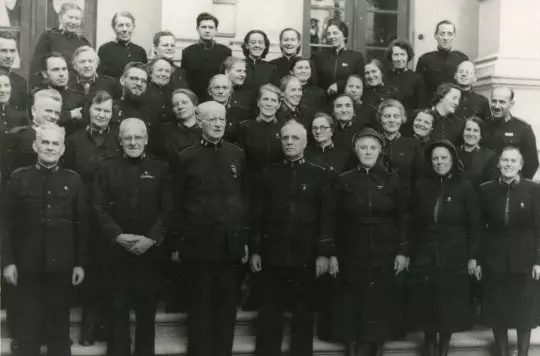
From bad to worse: The Salvation Army in communist Czechoslovakia
Papers from our archive detail the problems The Salvation Army experienced following the nationalisation of churches in Czechoslovakia in 1949 ...
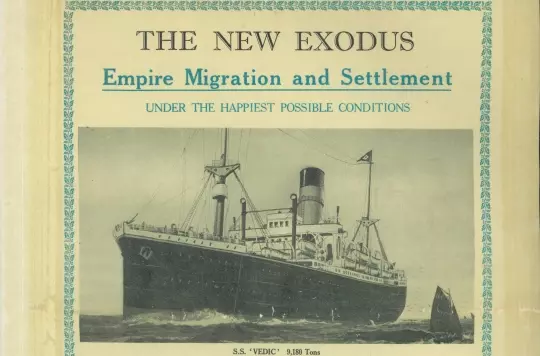
'The New Exodus': The Salvation Army and Emigration
It is a little-known fact that The Salvation Army was the United Kingdom's largest voluntary migration society in the first half of the twentieth century ...
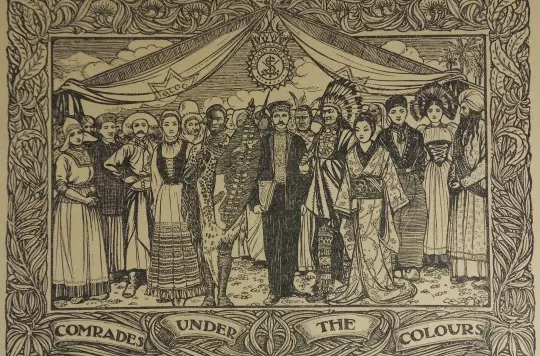
‘Comrades under the Colours’: International Congresses
The Salvation Army's first International Congress was held in 1886 to celebrate the organisation's 21st anniversary ...
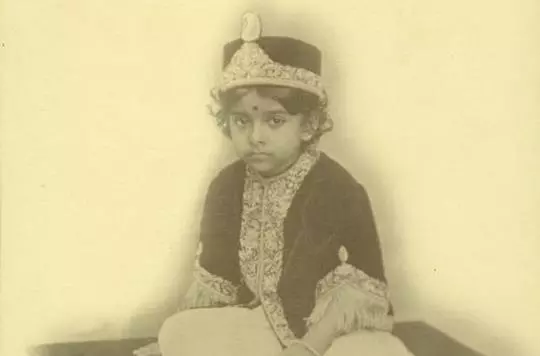
Mabel Poole: ‘Sister of Love'
Whilst re-cataloguing the IHC's several thousand strong collection of photographs, we came across unidentified loose prints of what appeared to be Indian royalty ...